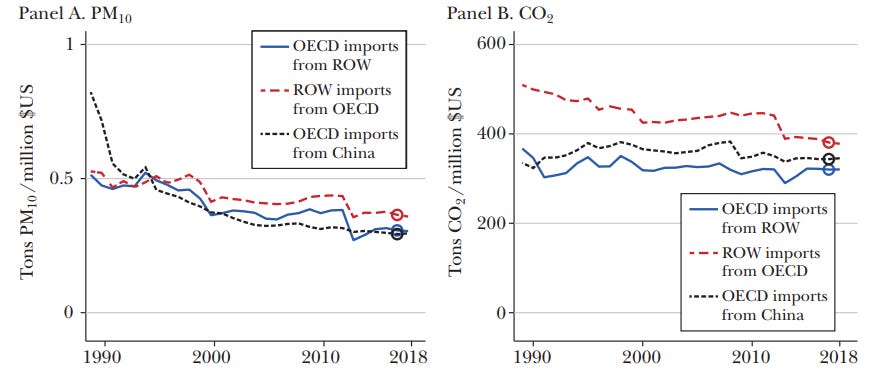One of the complaints of ESG sceptics you hear from time to time is that developed countries clean up their own economies by outsourcing polluting industries to the developed world and then re-importing the steel, cement, etc. that is produced there. However, a study by Arik Levinson indicates that this is likely not the case.
Yes, we nowadays import most of the steel or cement we use from developing markets, but to focus on that ignores the bigger picture that our imports from developing markets have increasingly shifted away from high-polluting or energy-intensive goods. Instead, we are importing more consumer goods and services that are less polluting as our consumption patterns have changed. The result is shown in the charts below. They show that the amount of pollution (particle matter on the left-hand side, CO2 on the right) per dollar of imported goods has declined over time.
In fact, if anyone has the right to complain it should be us in the industrialised world because the products, we produce for export are on average more polluting than the imports from developing countries. This may surprise you, but one has to be aware that exports from industrial countries to the developing world are mostly capital goods like airplanes, cars, and high-tech machinery, all of which are quite energy intensive to make.
Pollution intensity of traded goods
Source: Levinson (2023)
The question for the future is whether increasing environmental regulation will lead to more outsourcing of polluting industries to developed countries. And here things become tricky. For highly flexible processes that can easily be moved from one country to another, there are case studies that show that production has moved to countries with lower environmental regulations. But on an economy-wide scale, this effect seems to be minimal and definitely not economically significant. This doesn’t surprise me because if you remember that the goods that are produced in the industrial world are still produced there because of the know-how needed and crucial infrastructure (the rest has long been outsourced) then tightening environmental regulation is not going to make much of a difference. Boeing and Airbus will continue to produce their airplanes in the US and Europe because moving production facilities to East Asia is simply uneconomical. The same goes for high-tech equipment and machinery that is designed and built by highly qualified engineers and technicians. And while some of them may want to move to a new factory in South or East Asia for a while, the vast majority will not. And that means you simply can’t find the people needed to build these goods outside the US or Europe.





An interesting report. One aspect missing - we (Developed World) do not want manufacture of our aeroplanes etc exported to Asia. These industries provide well paid employment to higher skilled workers - exactly what we need in latter 21st century. In the UK there has been a lamentable lack of education & (re)training for engineering etc. Unless UK is to be a no skill low paid service economy, we need industry with skilled workers.